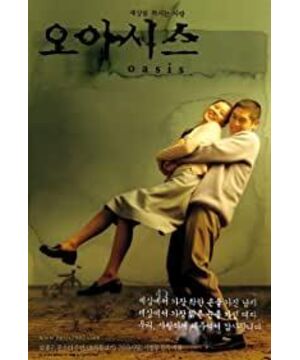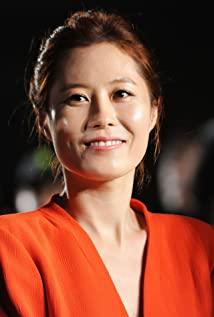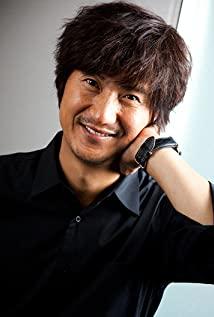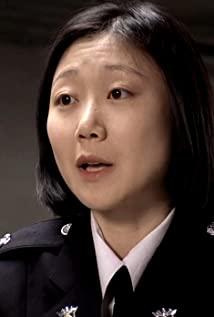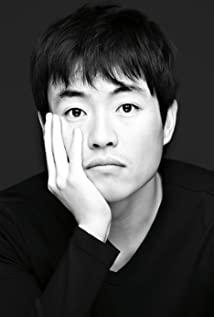Li Cangdong is 63 years old. Originally a writer, he has won many literary awards, but he is only famous in South Korea. Later, he established himself in the world film circle with his film works, and is known as a "realist poet". His knowledge of filmmaking was originally blank. After serving as the assistant director and screenwriter of "Want to Go to That Island", he gradually became familiar with the workflow and laid the foundation for shooting his first feature film three years later. "Green Fish" is the last in the "green trilogy" (along with its debut "Green Fish" and the most famous "Mint"). After "Mints", Li Cangdong only made two feature films, and the output was very small, and it was especially rare that the quality of the parts was extremely high, and he maintained a high level all the way. His works are dedicated to depicting the various states of the world, reflecting the changes of the times, and are very social. (Author's Note: This article was written in 2017.)
Li Cangdong always pays attention to the little people who are on the fringes of society and the bottom layer that is ignored by society. For example, in "Oasis", Hong Zhongdu (played by Xue Jingqiu), who was imprisoned three times and behaved perversely, suffered from severe cerebral palsy, and Han Gongzhu (played by Wen Suli), whose facial features were twisted and limbs twitched, is easily reminiscent of Jia Zhangke's debut novel "Little One". The thief and prostitute of Wu. The two pairs of protagonists embrace each other in a hopeless reality. The symbiotic warmth disappears for a short time, but it makes people moving and enchanted, like an oasis in the desert, a bright light outside the darkness.
The reason for the encounter between the protagonists of "Oasis" is also quite gray: Hong was jailed on the charge of accidentally killing a cleaning worker with a car. Hong Zhongdu's mind is no different from a child's, restless and exaggerated, doing whatever he wants. He excitedly played guessing games with his mother; curiously rode the food delivery motorcycle and shouted at the people filming the movie; when he was caught stealing a customer's car, his eldest brother also punished a child like a child with an iron rod. Smash his ass. When he was just released from prison, the elder brother warned Zhongdu: "You should be mature too, do you know what that means? As an adult, you can't do whatever you want, but you must be responsible for your own behavior. Work hard to fit in, pay attention to what other people think of you, that's what an adult should do."
Hong's actions regardless of the situation have caused the family to frequently fall into embarrassing and humiliating situations. He interrupted the restaurant owner and annoyed his elder brother who was looking for a job for him; when the pastor was leaving, he actually asked him to perform a prayer ceremony by the roadside; even on his mother's 70th birthday, he brought Gong-soo to a banquet in front of the whole family. , making the scene stalemate embarrassing. The family saw him as a useless trouble and prayed that it would evaporate. The sister-in-law and the younger brother confessed harshly: "Without you, I would feel that life is not bad, and we have nothing to worry about. Your brother and mother think so." "Zhongdu, do me a favor, Don't come to interfere with my life, okay? Please!" And he always smirked in disapproval, tucked in helplessness and sadness.
But Hong Zhongdu's nature is kind, and he also has a childlike innocence in his bones. However, Li Cangdong did not elevate the protagonist, so that he was small and humble in the moral level also has the supreme light. His ugliness and flaws are present throughout, and even at the end of the film, he escapes from prison by savagely robbing a strange woman and taking her phone to contact Gong-soo. Xue Jingqiu's performance is also precisely controlled. His appearance is wretched and perverse, but he is not the same as street gangsters. He always reveals the naughty temperament unique to children.
Han Gongzhu means "Han Princess", and the hope of the name is in stark contrast to the cruelty of reality. The disability makes her look like a monster in appearance. In theory, she can't take care of herself at all. It takes a lot of effort to complete any simple task, such as talking and eating. She is like a waste that was abandoned by her brother and sister-in-law in a dilapidated low-cost house. The three meals are provided by the neighbors, and the laundry, makeup, and cleaning are all done by themselves.
But Gong-soo's rich emotions and desire for beauty are no different from ordinary people. Alone at home, she fantasized about white doves flying between the houses, breaking the mirror and letting the white light reflected from the fragments leap out of the wall, turning into a butterfly jungle surrounding her. Every time I rarely go out, I look up at the blue sky with infinite yearning, even if the scene in the lens is ordinary and plain (the blue sky is also an extremely important image in "Miryang"). She likes clean white the most, and her heart is as pure and kind as white.
Wen Suli played Xue Jingqiu's beautiful and pure first love in "Mints". She is a very beautiful actress. She sacrificed her image for the role of "Oasis", and she showed ugliness in most of the film, with grief, pain, and joy. , The pleasure is diluted and blurred, and the expression of various emotions becomes difficult or even incomprehensible due to the distorted face.
The love development between the two is as sweet and beautiful as ordinary people, but their first acquaintance is ugly. Chung-du buys flowers for Gong-soo, steals the key to the flower pot and sneaks into the house, and rapes Gong-soo driven by desire, but fails because of the latter. After the accident, he blamed himself and slapped her face like a child. He woke her up with a shower and fled. But Gong-soo took the initiative to contact Chung-do after the incident. Because she wanted to know why anyone would send flowers to someone like her. Zhongdu returned to her house the next day after receiving the call. They called each other "General" and "His Royal Highness" and explored each other's hobbies. He took her out for fun, held her for a spin on the road, and sang K together. When Gongsoo is angry, he is like a woman in love.
When she sincerely asked Zhongdu to have sex with her, she was discovered by her brother and sister-in-law who came home suddenly and misjudged Zhongdu rape. He didn't argue, or because he knew no one would believe his words. Gongzhu, who was on the verge of collapse, lost his voice due to emotional tension, and his madness at the police station was also regarded as fear and anger towards the "rapist".
The so-called "adults" living in the real world are nothing but sanctimonious. The elder brother who repairs the car always reprimands his younger brother with his father-like authority, maintains a family's livelihood, and endures the burden of his younger brother. He seems mature and stable, but it was because Zhongdu voluntarily took the charge of crashing and killing him, so that his original life would not be ruined. In the end, when Zhongdu was arrested, he said that even though he was a real brother, he could no longer recognize him, and hoped that society would never exist again. This kind of people.
Gong Soo's brother and sister-in-law are even more hypocritical and chilling. Taking advantage of her sister's disability status, she lived in a spacious and bright welfare room by herself, and left her alone in a dilapidated house to "survive". After finding out that his sister was "raped", he was heartbroken with grief, but afterward tried to ask Zhongdu's family for damages (but the latter would rather he squatted in prison). Even her neighbor, who was taking care of her, had sex recklessly in the room despite her presence. They have been acting like a good guy with a smile on their faces, but they haven't seen the slightest sign of helping Gong-soo in their actions. But Li Changdong didn't use emotional shots to criticize them sharply, but just brought out the facts coldly.
The most amazing and exciting scenes in the whole film are that the "princess" suddenly becomes a normal person who can move freely, and Wen Suli unexpectedly returns to her original beauty. In the meantime, Li Cangdong dissolves the estrangement between reality and imagination, and seamlessly connects the transformations, which is fascinated and poetic, and the effect is natural and smooth. It's a pity that such a beautiful silhouette has only four sections, and it comes to an abrupt end, but this genius stroke is enough to shock and hold your breath.
The shots of "Oasis" are extremely simple and realistic, without pretense, which is contrary to the delicate and smooth tone of Korean films. It can be said that it is not "good-looking". There are simple Shaxian snack bars around.
But the charm of Lee Chang-dong lies in the construction of poetic symbols in the bland, the most obvious being the tapestry "Oasis" on the wall of Gong-soo's room. The dry branches outside the window screeched terribly, and the vertical and horizontal shadows were cast in the "oasis". Gongsoo was afraid of the night, symbolizing the cruel reality that hindered and destroyed his beautiful life. "General" is the "oasis" of her life. She uses magic to "drive away" those terrible voices. At the end of the film, she escapes from prison just to cut off all the branches to climb up a dead tree - this image is self-evident. Even more magically, in a long shot, the Indian women, children and elephants thorned on the "Oasis" enter Gong-soo's house and play music and sprinkle flowers for the dancing two. The whole film is covered with beautiful poetic metaphors, such as white tofu, fried noodles, and the aforementioned Jingguang and white pigeons.
Li Cangdong's films all have a delicate and poetic ending. For example, the confrontation between the farm shop and the steel forest in "Green Fish", the male protagonist in "Mints" looks at the beautiful scene but suddenly foresees the sadness of the future (this film is a flashback structure), especially the "Miryang". The ending surprised me (the film won Jeon Do-yeon at Cannes, the second Asian actress to win this honor after Maggie Cheung):
Jeon Do-yeon returned home and sat in a chair, wanting to cut her hair by herself (he just slammed out the door angrily after half-cutting at the barber shop), Song Kang-ho pushed open the door, walked in and took the initiative to hold the mirror for her. There was only herself in the mirror, and her face was arrogant and bored. The camera pans down slowly, the cut hair falls on the ground, flutters in the wind, and finally freezes on the pile of debris. The shadow of Song Zhijing was reflected in the sunlight, and the background sound was the noisy play of children outside the door, accompanied by the sound of the TV and the whistling of the wind. Such a seemingly simple and ordinary long shot is actually very cleverly designed, and there are metaphors everywhere. Li Changdong is really a poet!
At the end of "Oasis", there is also an open hope after despair: the bright and warm sunlight shines into the house, and the light makes the dust flutter in the air of Gongzhu's bedroom. Outside the door, she is brushing the living room with a broom. Dust, the background sound is a letter from Zhongdu's prison:
"His Royal Highness, I am your general. I hope you are healthy and everything is fine. I am fine here, taking care of myself, and I am slowly getting used to the bean rice here. But don't worry, they don't all use beans. .but I always think of you when those weird beans are mixed in. Now I don't like beans either. I dream of having tofu the day I go out. You must be bored at home by yourself I can play football, ping pong, and other sports to keep in shape, so don't worry about me. I'll buy you lots and lots of delicious food when I come out. Make a list of what you want until I get it to you Take care until you write. Goodbye."
View more about Oasis reviews


